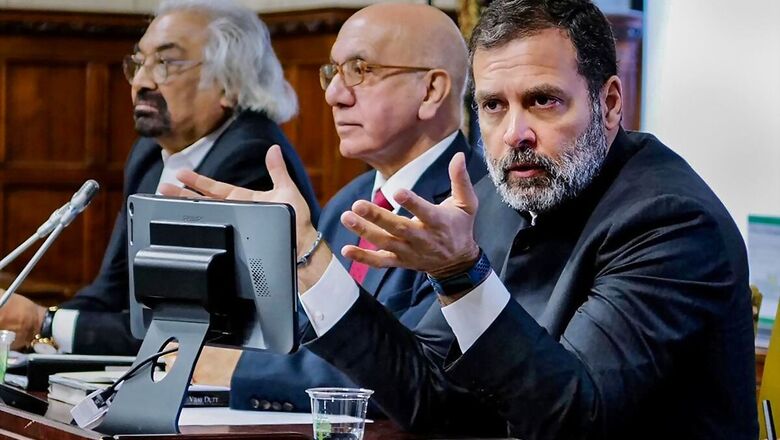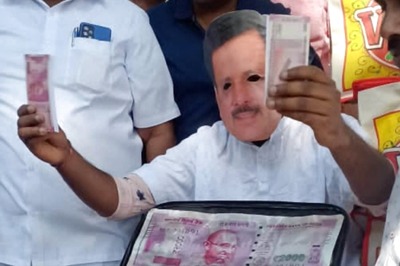
views
Having faced two electoral debacles in 2014 and 2019 – and also a string of Assembly election losses across the country – Rahul Gandhi-led Congress seems to be increasingly counting on foreign censure as a way of embarrassing the Narendra Modi government. The Congress apart, most liberal and Left critics of the Modi government also react enthusiastically to any report in a Western newspaper, survey agency or think tank that says India is on the brink of collapse.
More than the Bharatiya Janata Party (BJP), it is the inflicting of these self-goals that is likely to prolong the woes of critics of the BJP and the Rashtriya Swayamsevak Sangh (RSS).
In the last few years, the BJP has been able to whip up a wave of nationalism that looks at the nation as sacrosanct. From sharp popular reactions to the 2016 event at Jawaharlal Nehru University (JNU) to the increasing propensity of people to brandish the national flag on their vehicles in the run-up to Independence Day and Republic Day, a wave of insistent national pride is the order of the day. Under such circumstances, the political and ideological critics of the BJP need to foster an alternative brand of nationalism or simply lie low and bide their time.
However, in what can only be called an act of inflicting self-damage, voices opposed to the BJP, starting with Rahul Gandhi himself, are looking at overseas’ endorsement of their charges against the regime.
Rahul Gandhi did it again on Monday evening. In the 75th year of Indian independence, he addressed a gathering at the British Parliament where he said that the Modi government had destroyed the culture of discussion in the country and that the Opposition was not allowed to speak in India.
Gandhi’s long trip to the United Kingdom (UK), with multiple talks there, ended up repeating that he can speak at Cambridge or Harvard but not at an Indian university. He has added that he speaks abroad because he isn’t allowed to, in India. What Gandhi forgets is that Modi would have found it impossible to enter – let alone speak – at universities like JNU or Hyderabad before 2014. Not just that, Modi’s name was struck off the list of speakers at a conference in Wharton in 2013 despite the fact that it was to be a virtual lecture after some Indian-origin professors wrote a tough letter to Wharton against allowing him to speak.
While it is true that Gandhi’s speech in Parliament on the Presidential address to both Houses was expunged from the proceedings, it is readily available at the click of a mouse on the Internet and in news reports. It is also true that he has made multiple speeches across India and addressed several press conferences in the last few months. He had also gone to JNU when sedition charges were slapped on some students in 2016.
Yet, Gandhi thought that insisting India is down in the dumps in the British Parliament would somehow work for him. He said that the microphones were often turned off in the Lok Sabha when he tried to speak. “The reason is our government simply does not allow any idea of the Opposition to be discussed…when we try to raise questions, we are not allowed to. It is shameful but true” he said. “This is not the India all of us are used to. Our country is an open country, where we respect each other’s opinions, and that atmosphere has been destroyed.”
The unwise insistence by Gandhi to show India as undergoing collapse abroad is unlikely to help the Congress. It immediately renders the Congress’ commitment to nationalism suspect in the minds of millions in India and bolsters the BJP’s claim to a monopoly over it.
Unfortunately, similar attempts by a large ecosystem of Left and liberal opinions also end up damaging the Congress. The political Left has already been decimated and regional parties do not figure in these debates around ‘attacks on India from outside’ in any way. When students of universities like Hyderabad and JNU insisted on publicly watching the BBC documentary on Modi, it was the BJP that stood to gain. For, in the eyes of many people, the BBC was not above a Supreme Court-appointed SIT during UPA days or the apex court itself, and there was no context to the two-part documentary in terms of timing. If anything, the message that went to ordinary voters was a ‘foreign conspiracy’ to destabilise India. Two of my friends who are engineers told me over the phone that the timing of the Adani-Hindenburg report and the BBC documentary suggested that it was “world vs Modi” now.
The point here is not whether such readings are alarmist. The point is the impact of such perceptions on the electoral behaviour of people. While even the UK and the US distanced themselves from the contents of the BBC documentary, critics in India went to town with it.
Such is the perception of a conspiracy of entrenched elites in India against Modi, in collaboration with foreign powers, that when academic Salvatore Babones told Rajdeep Sardesai at the India Today Conclave that “Indian intellectuals as a class are anti-India”, there was thunderous applause by the audience. Babones’ argument: Survey agencies’ reports of democracy and freedom suffering in India are not a result of the agencies being biased but their respondents – intellectuals at places like Harvard and JNU – being biased against their own country as a class. The point, again, isn’t whether Babones is right but how his claim was received by the audience. The applause said it all.
Given the rise of common sense that there is a global conspiracy to malign India by unduly attacking Modi, the last thing for Rahul Gandhi to do is to be seen as part of the ‘conspiracy’. Intellectuals who applaud a putting down of the Modi government from agencies abroad have nothing to lose. But Gandhi has elections to fight and win or lose.
If he had thought strategically, the crux of Rahul Gandhi’s address in the precincts of the British Parliament would have been something like: “I am a member of an Opposition party in India but I stand here as a representative of the people of India as an MP. My attempt will be to tell this august gathering the contribution and promise of India for humanity.”
While Narendra Modi has also criticised the Congress in front of the Indian diaspora abroad, Gandhi should just check what he said at a public meeting in Delhi in the run-up to the 2014 Lok Sabha polls, when he had become the party’s face for the polls. Referring to news reports that Nawaz Sharif had referred to the then Indian Prime Minister Manmohan Singh as “dehati aurat (rural woman)”, Modi said before a packed crowd, “Miyan Nawaz Sharif, mere desh ke Pradhan Mantri ke liye aisi baat bolne ki himmat kaise hui? (how did you dare say this about the Prime Minister of my country?)”
Gandhi needs to think strategically and wrest the discourse of nationalism from the BJP if he wants to have even a slender chance of returning to power at any time in the near future. He has talked about reports of Chinese incursions, but in a manner that is counter-productive. Saying that our soldiers are being thrashed (hamare jawaan pite ja rahe hain) will only rile the army, as the choice of words is deeply offensive.
The BJP being comfortably in power may indeed be a symptom of the problems that the Congress face. And those problems show no signs of coming to an end.
Vikas Pathak is a columnist who teaches at Asian College of Journalism, Chennai. The views expressed are personal.
Read all the Latest Opinions here




















Comments
0 comment